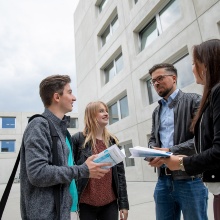Since 2021, the uni has been offering interested and motivated students a special program. In interdisciplinary teams, students work on self-selected project topics related to a specific annual program. I have been involved in the School for Talents program at the Uni Stuttgart for almost a year and I would like to tell you about my experiences.
How I became involved in the School for Talents
Another info email from the uni arrived in my inbox. I usually quickly click these away, but this time I used the mail for procrastination purposes, to avoid studying for an exam on Advanced Mathematics 3 for five minutes in March 2021. An interdisciplinary project on the subject "Reimagining Spaces - New Utopias" did sound interesting - it got my attention.
Lectures are being held online, and I take my chance to contact other students and to broaden my horizons beyond my own subject. I decide to apply. Because the program is also aimed at international students, everything is in English. A few weeks later and I have not only passed my mathematics exam, I have also been accepted onto the program.
The project beings
The introductory week online at the beginning of May began with a full program. We, that is thirty students from very different study programs, meet and get given various content-related suggestions, everything from architecture to working together in digital space. Over the next few months, the program comprises a colorful mix of more input and informal group work. We form a project group and decide on a more specific project subject. But we weren't simply left to our own devices. INNOKI, a Berlin start-up for innovation consultation and design thinking that is usually involved with companies like Daimler and Bosch supported our project.
The design-thinking process
In mid-May we start to identify specific topics. We are introduced to the methods of design-thinking. Over time, we gather several project ideas. Students with similar interests form small groups of two to five people. I become part of the "office group". Other groups are involved in topics such as urban development, sustainability, science communication and art and media. My group of five is looking at the new world of work and the workspaces that go with it.
It wasn't as easy as I expected to limit the scope of the subject. Interviews with fellow students, family members and professor illustrate various perspectives. Together, we decide to concentrate on study spaces. To familiarize ourselves further with the subject matter, we visited a small company in ARENA 2036 on Campus Vaihingen, amongst others, which enhances office furniture with additional "features".
We begin to meet regularly on Sundays and realize that it is not only designing study rooms that is difficult, but that even finding such a room at the uni can be a problem. We decide to design a booking system for uni study space. Which study situations demand which spatial conditions and equipment?
In addition to "hard work" there is also plenty of time for fun. At such meetings, we began to understand why MINT-students always get so stressed before exams and why humanities students often despair about their term papers. 2022 began with a meeting of everyone involved in the project to discuss the topic "Science Engagement", which refers to the connections between science and the normal world. We will complete and present our project work by May.
What I learned
Interdisciplinary collaboration is a great new experience for me. The different perspectives from various fields all considering the same problem is really valuable. But there were also some points where even our shared knowledge was not enough. Some things just aren't possible without specific expertise. Joint time management is also a skill that must be learned.
Ellen Meyberg
Comment on this article
Your email address will not be published.



